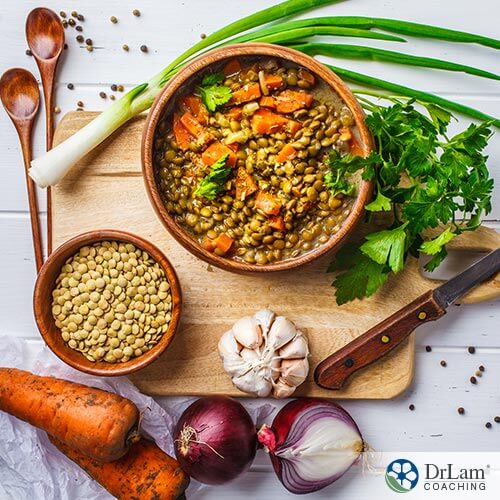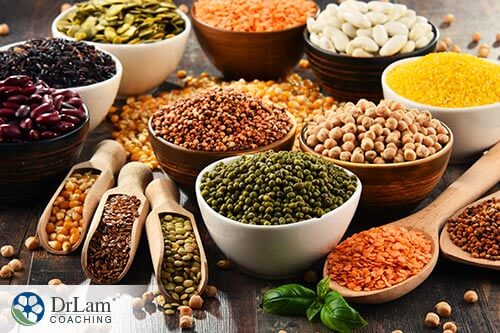You probably know by now that lentils are good for you. Packed full of essential nutrients your body needs, they’re a fast, cheap, and versatile way to improve your health overall as well as any other disorders you have. If you need more reasons to eat these tiny balls of goodness, then here are some of the most important lentils benefits to take advantage of.
 Lentils are legumes that are native to North America and Western Africa. Cultures throughout known history have grown and eaten lentils and they’re one of the earliest domesticated crops.
Lentils are legumes that are native to North America and Western Africa. Cultures throughout known history have grown and eaten lentils and they’re one of the earliest domesticated crops.
Lentils have a nutty, mild flavor that makes them work well with a range of other foods. They’re also quick and easy to prepare and cheap to buy, making them an ideal staple food for people on a budget. Lentils look like small, lens-shaped beans and come in black, red, yellow, brown, and green. They can be bought whole or split with the husks removed and are available in dried or canned forms.
There are lots of lentils benefits to be aware of when you’re thinking of adding them to your diet. These are some of their top benefits.
One of the main lentils benefits is that they’re very nutritious. They make a great part of a balanced diet. One cup of cooked lentils has 230 calories and contains:
One of the most important lentils benefits is that it contains nutrients that boost heart health. It contains fiber, which helps to lower bad cholesterol levels, as well as nutrients that lower blood pressure like calcium, potassium, and magnesium.
Lentils are also low in sodium, which may also help to lower your blood pressure.
Low iron levels are a common cause of fatigue, particularly in people who don’t eat a lot of meat. If you experience this issue, then eating lentils could help as they’re a good source of nonheme iron. Nonheme iron is the iron found in plant sources. Note that this form of iron is harder for the body to absorb, so it needs to be eaten with vitamin C foods to boost absorption.
Lentils contain fiber, which helps to keep your gut healthy by promoting regular bowel movements and preventing constipation. They also provide the body with prebiotics that help feed healthy gut bacteria. This may help to prevent or alleviate digestive conditions.
Lentils contain lots of fiber and protein, both of which help you feel fuller for longer. If you’re trying to lose weight and struggling with hunger pangs, eating lentils may help with this and aid your weight loss efforts.
Lentils contain folate, which is essential for the health of pregnant women and their fetuses. Folate helps prevent neural tube defects in newborns. It may also reduce pregnant women’s risk of developing gestational diabetes.
There are more lentils benefits than drawbacks. However, lentils do contain fermentable carbohydrates, which can upset your stomach if you’re sensitive or have gut problems like Irritable Bowel Syndrome (IBS).
Lentils also contain a lot of fiber, which can cause flatulence and constipation if you’re not used to eating a lot of it. To avoid this, start out with small amounts of lentils and increase the amounts slowly over a few months. You can also skim the scum and bubbles off the top of a boiling pot of lentils to reduce flatulence-causing starches.
To enjoy these lentils benefits, you're going to need to cook them properly. Here’s a quick, easy recipe that works for all lentil types, with some adjustments to the cooking times:
You can also adjust cooking times according to how firm you want the lentils to be and how you plan to use them. Once your lentils are cooked, here’s how to use them:

When you make sprouted lentils, you’re starting the germination process, basically encouraging them to grow. This process actually changes and increases the amount of nutrition in the lentils, increasing Vitamin B and carotene levels in particular. All types of lentils can be sprouted as long as they’re whole, not split.
Sprouted lentils can be used just like regular lentils. You can make them into soup, eat them raw in salad, or eat them raw in a bowl of other healthy foods.
Here’s how to make sprouted lentils:
A healthy, nutritious diet is incredibly important when you have Adrenal Fatigue Syndrome (AFS). A diet that’s filled with sugary and processed foods causes stress and inflammation throughout your body, and it often contributes to adrenal fatigue.
AFS occurs when you’re under stress because of an inadequate diet and other factors over a long period. Typically, stress is resolved by the NeuroEndoMetabolic (NEM) stress response. The NEM stress response works in the background and is driven by the cortisol created by your adrenal glands. When you’re stressed, cortisol is released and causes changes in your body’s systems. When the stress is resolved, your cortisol levels will go back to normal.
However, with AFS, stress is constant and so the NEM stress response remains active. This situation can be very damaging when it goes on for too long. The circuits can become unbalanced, causing a range of symptoms and problems as well as declining overall health.
The only way to reverse AFS is to remove causes of stress and help your body return to a more balanced state. Improving your diet is one of the best strategies for doing that. In fact, eating a healthier diet is a great way to begin addressing almost all health conditions. Improving your diet by adding healthy foods like lentils can help to:
AFS is strongly linked to nutritional deficiencies and an inadequate diet. Adding foods like lentils can help to fill these gaps and give your body what it needs to heal and function at its best. It also helps bolster your reserves against other conditions.
The health of your gut is not only pivotal to the amount of inflammation in your body, it’s also strongly linked to your brain health. If your gut is unhealthy, then it will cause inflammation and issues like sleeping problems, mood disorders, brain fog, and other symptoms.
The fiber and the prebiotics in lentils can help improve your gut health and nourish the healthy bacteria in your gut. This will naturally help to lower stress levels and improve AFS. This is one of the most important lentils benefits.
Cardiac symptoms as very common. Obviously, if you experience these kinds of symptoms then you need to get them checked out with a doctor first. But if you do that and your doctor can’t find anything, then you need to look at other factors that may be causing your symptoms. Improving your diet to support a healthier heart and lower blood pressure and cholesterol will go a long way toward helping symptoms.
Fluctuating and low energy levels are common complaints. These problems often lead to overeating, increased coffee intake, and a diet that relies on sugar and fast food to spike energy. By providing the body with protein and fiber, lentils may help to stabilize blood sugar levels and act as a long-lasting source of energy.
 These important lentils benefits can help to improve your health overall if you eat them regularly as part of a healthy diet. Here’s how to add them to your diet without causing digestive problems or other issues if your body is sensitive:
These important lentils benefits can help to improve your health overall if you eat them regularly as part of a healthy diet. Here’s how to add them to your diet without causing digestive problems or other issues if your body is sensitive:
There are many lentils benefits that you need to know about if you’re thinking about adding more of these legumes to your diet. Delicious, cheap, and nutritious, lentils could help your health overall as well as positively impacting specific disorders and health concerns.